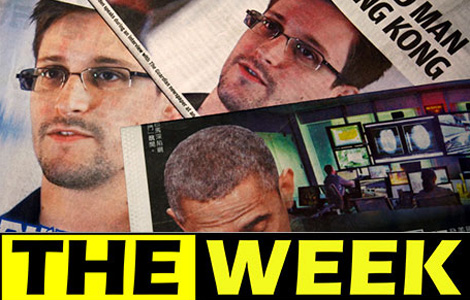US diplomat lays out vision for East Asia
Updated: 2013-06-22 09:57
By Chen Weihua in Washington and Zhang Yunbi in Beijing (China Daily)
|
|||||||||||
Daniel Russel, US President Barack Obama's pick as top diplomat for East Asia, believes that the US strategy of rebalancing toward Asia needs to be rebalanced.
In a Senate Foreign Relations Committee confirmation hearing on Thursday afternoon, Russel proposed that diversification of the rebalance strategy is of "first and foremost" importance.
The security element underpinning the Asia strategy is hugely important, he said. It will not go away and it must not go away, he added.
"We must strengthen that," he said.
"But there is more to America than hard power. In fact, it is the economic agenda, the energy agenda, the education agenda, the values agenda, the people-to-people connection, the public diplomacy, that I think in the long run will have the most significant and enduring impact in this young, thriving and dynamic region."
Russel was nominated by Obama on May 15 as assistant secretary of state for East Asian and Pacific affairs to replace Kurt Campbell, who resigned in February. The 59-year-old career diplomat is currently a special assistant to Obama and senior director for Asian affairs on the National Security Council. His confirmation is expected to be swift.
He said he will try to do everything in his power to lower the temperature in the East and South China Seas and push claimants onto a diplomatic track.
Many experts, such as Kenneth Lieberthal of the Brookings Institution and Stapleton Roy, the former US ambassador to China, have suggested that the US should adjust its rebalance policy, which has focused too heavily on the military aspect.
The growing US military posturing in the Asia Pacific has not only caused anxiety in China, which believes the strategy is aimed at containing China, it has also worried some other countries that do not want to be forced to choose between China and the US.
Such concerns were discussed when President Xi Jinping met Obama in Sunnylands, California this month.
Russel's remarks have demonstrated that Washington remains focused on the Asia-Pacific region as well as on the Korean Peninsula and the South China Sea issue, said Tao Wenzhao, an expert on the US studies at the Chinese Academy of Social Sciences.
"The comments were made after the Chinese president and his US counterpart met earlier this month and the opinions between the lines, generally speaking, resonate with Washington's pledge to build a new type of relationship between major powers with China," Tao said.
Russel described China as "hugely important and hugely consequential a country in relationship with the United States" and said there is a need for balance between the cooperative elements and competitive aspects of the bilateral relationship.
One of his challenges, he said, will be to ensure that the two countries cooperate more. "In our competition, we are assured that competition is a healthy one," he told.
Yuan Peng, an expert on US studies at the China Institutes of Contemporary International Relations, said it is unlikely that China and the US will follow the zero-sum game pattern in the future.
"The two major powers will see their strengths on the rise, respectively," he said.
The mood at the one-hour hearing was relatively relaxed, compared with several contentious hearings for other Obama nominees, such as Secretary of Defense Chuck Hagel and Secretary of Treasury Jack Lew. Only two Senators, Ben Cardin from Maryland and Christopher Murphy from Connecticut, questioned Russel at the hearing.
Russel, with his wife and two sons sitting behind him, said the US is looking for a model of practical cooperation with China that delivers benefits to both people, and to the region, in areas like climate change.
He praised the recent Xi-Obama agreement on working through the Montreal Protocol to phase out the use and production of hydrofluorocarbons, or HFCs, which are commonly used in air conditioners and refrigerators, saying it "will pay dividends down the road."
"North Korea is the other area where our positive cooperation is not only possible, but essential," he said, adding that both Obama and Xi are committed to deepening their dialogue and cooperation efforts to denuclearize the Democratic People's Republic of Korea.
The meeting on Wednesday in Beijing between China and the DPRK and the one in Washington among the US, Japan and the Republic of Korea have both expressed the hope of resuming the stalled Six-Party Talks.
Related Stories
Obama taps diplomat to oversee East Asia 2013-05-17 03:05
Today's Top News
China in $270b oil deal with Russia
Agreement heralds further cross-Straits service trade
'Goodwill' voiced in solar row
US files charges against Snowden
Economic confidence levels drop
Jet exporter to spread wings abroad
Obama nominates new FBI director
In with old and in with new
Hot Topics
Lunar probe , China growth forecasts, Emission rules get tougher, China seen through 'colored lens', International board,
Editor's Picks

|

|

|

|

|

|





